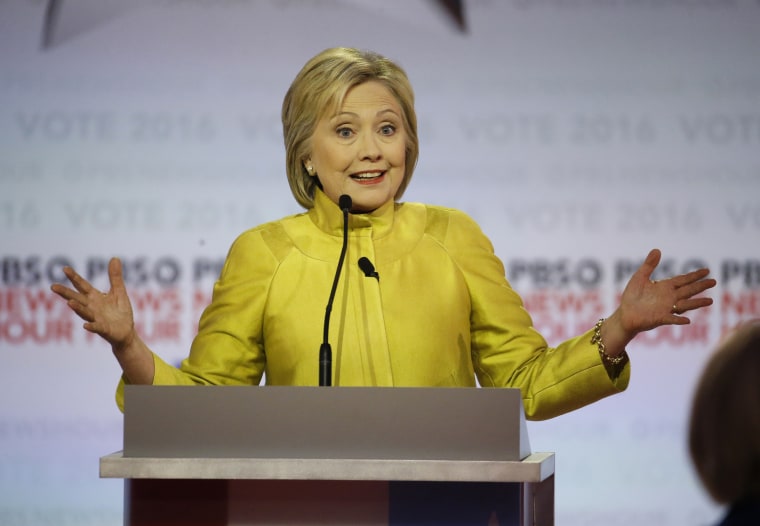Hillary Clinton sought to douse Bernie Sanders’ perceived passion with a cool dose of realism in Thursday night's debate featuring lengthy exchanges on foreign policy, race and Barack Obama's legacy.
Clinton has struggled to find a clear and inspiring message on the stump as Sanders makes uplifting promises. But during the PBS debate Thursday night in Milwaukee, Clinton adopted a new more measured tone to reflect her message, and honed her rhetoric.
Instead of taking swings at her opponent as she has in previous debates, Clinton made it clear she agrees with Sanders’ progressive principles. She let him throw the punches while she subtly undermined his competence and readiness to enact those principles.
Clinton began the night by saying she wants to “knock down all the barriers that are holding Americans back,” not just the economic ones Sanders emphasizes. And she ended the evening with a devastating new line: “I am not a single issue candidate and I do not believe we live in a single issue country.”
Blow-by-Blow: Clinton and Sanders Spar in Wisconsin
While the debate overall was far more subdued than previous face-offs, there were some notable exchanges.
This was the first debate since Sanders’ New Hampshire primary blow out, and the last time they will face off before heading into nominating contests in more diverse states like Nevada and South Carolina and the 11 states that vote on March 1.
The candidates had lengthy exchanges on race and criminal justice reform, where they largely agreed and made sure to name-check key African-American leaders like South Carolina Rep. James Clyburn.
But a long-simmering tension over the legacy of Barack Obama boiled over when the candidates had their most aggressive and extensive exchange on the subject. Obama remains hugely popular among Democratic primary voters, and especially African Americans, who dominate the South Carolina primary.
“The kind of criticism that we’ve heard from Senator Sanders about our president I expect from Republicans,” Clinton said.
Sanders, clearly agitated, called that a “low blow” and shot back, “one of us ran against Barack Obama. I was not that candidate.”
“Last I heard, a United States senator had the right to disagree with the president, including a president who has done such an extraordinary job,” he said, his voice growing louder.
“What I am concerned about,” Clinton replied, “is not disagreement on issues,” she said before ticking off times Sanders has said he is disappointed in Obama.
Sanders has indeed been critical of the president. “Not a low blow,” tweeted Obama adviser David Axelrod, who has been critical of both candidates. Sanders “was among those who mused in ‘11 about encouraging a challenge from left” to Obama’s reelection.
Full Cover of the 2016 Presidential Race
Earlier in the debate, Sanders promised that race relations will “absolutely” be better under a president Sanders than under Obama. He told MSNBC Thursday that Obama had not exhibited the leadership needed to enact change in Congress.
Here and elsewhere, Clinton stayed unusually calm and allowed Sanders to go on offense – a marked shift from her previous debate performance.
However, Clinton did come alive as the discussion moved to foreign policy, a key strength for the former secretary of state. She dug up votes Sanders took in the 1990s to undermine his claimed anti-interventionist stance, she questioned the depth of his understanding of world affairs, and she tackled his prime foreign policy argument on voting against the Iraq War.
“When people go to vote in primaries or caucuses, they are voting not only for the president. They are voting for the commander in chief,” she said.
But while Sanders was rocked back onto his heels for much of the exchange, he fought back strongly after Clinton invoked praised from Henry Kissinger, the former secretary of state loathed by many progressives. “I am proud to say Kissinger is not my friend. I will not take advice from him,” Sanders said. “I happen to believe that Henry Kissinger was one of the most destructive secretaries of state in the history of this country.”
Clinton responded by saying that she receives advice from a wide range of people, while “we don’t know who it is” that Sanders listens to.
“Wellm it ain’t Henry Kissinger,” Sanders shot back.
The two also battled over immigration, an issue which has not come up much at all in previous debates, but which is likely to play an important role in the Nevada caucuses next week.
Both came armed with opposition research. Sanders mentioned that Clinton said in 2014 during the Southern Border crisis that children should be sent back to their home countries to “send a message.”
Clinton, meanwhile, noted that Sanders voted against a 2007 immigration bill. He shot back by noting it was opposed by many Latino groups and the Southern Poverty Law Center.
Finally, Sanders had one of his stronger moments of the night when he challenged Clinton on campaign finance and her connection to super PACs. “It’s not my PAC,” Clinton said. In, fact she has two super PACs closely tied to her – one that coordinates directly with her campaign and another that is run by her former aides and that gives money to the super PAC that coordinates directly with her campaign.
She went on to say that Obama took money from Wall Street too, but that donations don’t necessarily influence people’s’ decisions.
“Let’s not insult the intelligence of the American people. People aren’t dumb. Why in God’s name does Wall Street make huge campaign contributions? I guess just for the fun of it; they want to throw money around,” he said sarcastically.
Overall, Clinton may have dented Sanders’ momentum a bit, but the debate is unlikely to fundamentally change the dynamic of the race going forward, except to preview coming fights over Obama’s legacy.
This story first appeared on MSNBC.

